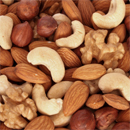 They might be high in calories but they do have a time and a place. In fact, one study found that replacing a high carbohydrate snack with two ounces of nuts (per day) helped with glycemic and lipid control for those afflicted with type-2 diabetes.
They might be high in calories but they do have a time and a place. In fact, one study found that replacing a high carbohydrate snack with two ounces of nuts (per day) helped with glycemic and lipid control for those afflicted with type-2 diabetes.
Two ounces seems to be the magic number, too. Other experts found that consuming two ounces of nuts a day would not do much to increase overall weight, despite their high caloric value. Not only this, but nuts have been shown to decrease the overall risk of a heart attack. So all of those extra calories might be worth the extra trouble.
Advertisement
So now that we know (and it was already common knowledge) that nuts serve a purpose for heart health, and to help people who are suffering from type 2 diabetes, it has become abundantly clear that anyone can benefit from this healthy snack.
RELATED ARTICLE: The Mystery Behind Counting Calories
That begs the next question. Which nut is best? Participants in one study (featured on the Dr. Oz Show) received raw almonds, pistachios, walnuts, pecans, hazelnuts, peanuts, cashews and macadamias. Not surprisingly, the results of the study also pointed out nuts you want to avoid. Naturally that included anything that is honey roasted, or is covered in sugar or chocolate. It is best to stick with nuts in a raw state, which means that you must skip salted versions, as well.
Four Reasons to Eat Nuts
- Most types of nuts contain unsaturated fats, especially monounsaturated fat. This type of fat has been shown not to raise blood cholesterol levels like saturated fats. Monounsaturated fats have the additional benefit of raising good cholesterol, which can reduce the risk of heart diseases.
- Probably most notably, nuts contain essential fatty acids which are vital for growth, healthy skin and hair, blood pressure control, immune response and blood clotting.
- Nuts have loads of arginine, which may help improve the health of your artery walls and make them more flexible and less prone to blood clots.
- Nuts have been long considered to be one of the best natural sources of Vitamin E, an antioxidant, and are rich in protein, dietary fibre, magnesium, copper, phosphorus, potassium, selenium and folate.
Advertisement
More Proof on the Health Benefits of Nuts
The findings of one study reveal that one specific diet has been linked to a lower risk of metabolic abnormalities.
The Mediterranean diet is known to have a high intake of cereals, vegetables, fruits and olive oil, not to mention a moderate intake of fish and alcohol and a low intake of dairy and meat. Not only this, but the Mediterranean diet also has an additional daily serving of mixed nuts. And as we have learned, abdominal obesity and high cholesterol, high blood pressure and high blood glucose levels are all risk factors for cardiovascular disease.
